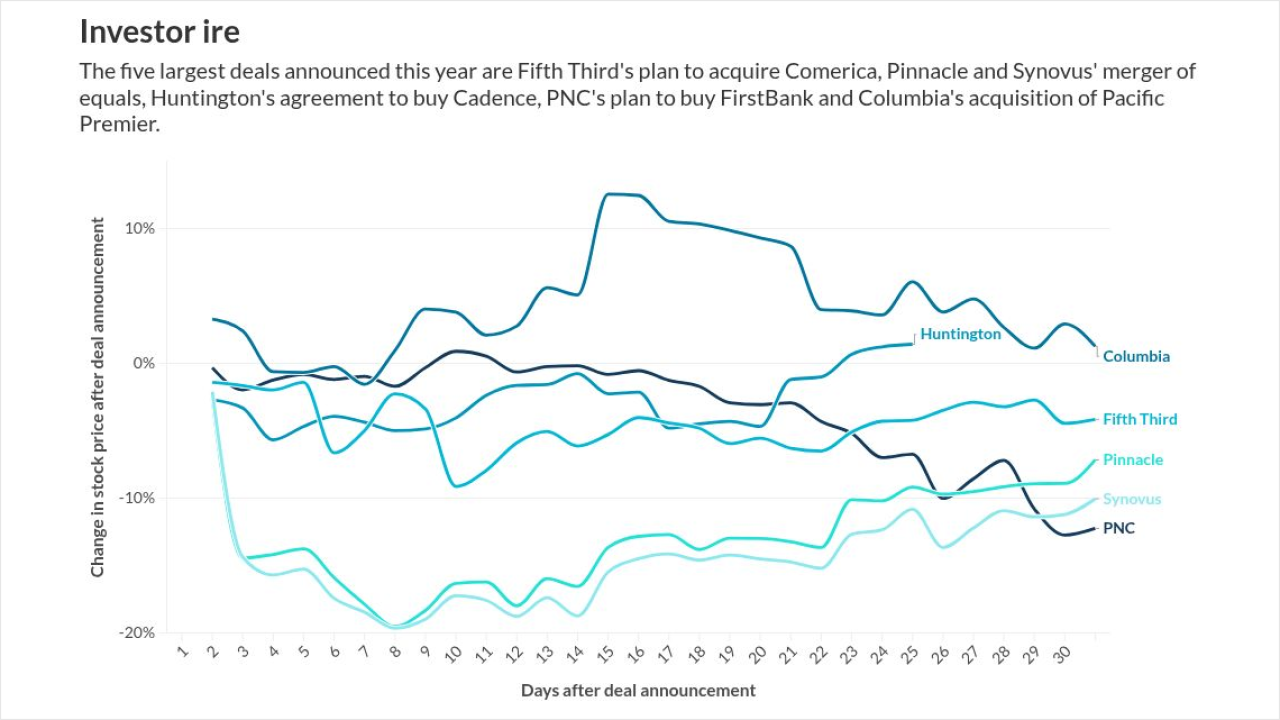When Dick Evans
Evans, who had to weather a fair share of previous oil-related crises, isn't concerned.
The price of crude oil has collapsed in the past year, at times going for less than $30 a barrel. Those prices have put pressure on Cullen/Frost's energy portfolio and have
-
The energy sector downturn took a big bite out of quarterly earnings at Cullen/Frost Bankers in San Antonio.
January 27 -
There is a growing belief that reserves for energy loans should represent 5% of a bank's exposure to the sector. Three banks have already announced plans to move in that direction, prompting speculation as to which other lenders will be next.
January 13
Still, Evans is optimistic about Cullen/Frost's ability to weather the current storm.
"It's a nonevent, in many ways," Evans, the $28 billion-asset company's chairman and chief executive, said in an interview last week.
"We're going to be able maneuver through it," he said,
Evans, 69, will continue to play a crucial role at Cullen/Frost in coming years. He'll still provide
The leadership shuffle comes as Cullen/Frost shapes its response to the oil rout. The company last month boosted a specific reserve to 3% of energy loans, while competitors such as
"I feel very comfortable with exactly where our reserve is," Evans said.
Evans, one of American Banker's
Here is an edited transcript of the interview with Evans.
How has the oil rout affected the regional economy?
DICK EVANS: The Texas economy is still doing extremely well. I think we've just got to get more people down from New York to see Texas. You know, everyone thinks we're just a bunch of cowboys running around oil and gas wells. It's a little bit different than that. It's very diversified.
If you look at health care, it's tremendous. If you look at markets, like the Dallas and Austin markets, they haven't even noticed that oil is down. Even in Houston, where about 48% of the economy is related to energy, there are a lot of world headquarters. Yes, they've had a decline, but that market continues to grow.
Has the downturn affected commercial real estate?
That's a big question. As we look at the different markets, we saw multifamily, and the merchant builders that build lots of big projects, pull out of the market about a year ago. I think you'll see some weakness in the subleasing market, but it will continue to be very manageable.
There's a real correlation in job growth and the office market. Quite frankly, over the next three years, if [jobs] grow ... you'll see that start filling in the office buildings in an orderly fashion.
Do you think this cycle will change how banks lend to energy companies?
What changed us was being in the business for a long time. That's the reason why I'm very comfortable with where we are. In fact, if you and I had visited a year ago, the loans that we had identified and thought would be weak are the same loans that are weak today. So it's another way to say there have been no surprises. I think that's the good news.
These general statements that are being made about the industry and the models, whether you're a rating agency or a regulator, quite frankly in lots of ways are misleading.
You're retiring next month. What have you learned from the succession planning process?
What I think is so important about Cullen/Frost is that it's 148 years old. Its entire history has had a transparent transition in its CEO process. I think that's the way that every company should make a transition. You've got to be doing succession planning always, always moving forward, building for the future and bringing people along. That's what I've been doing for 45 years.
What does the M&A market look like in Texas?
It's a great market. We came from a unit-banking state prior to the 1980s, so that's how we operated the banking system. Then of course after the challenges of the 1980s, we went to a branching state. We still have lots of unit, individual banks.
I think you will continue to see consolidation – and mainly as it relates to regulation. Any bank that has $1 billion or less in assets cannot survive with the regulation we have today and make a profit. That's unfortunate, because they didn't commit the sins, and yet they're getting punished.
Does Cullen/Frost have any M&A plans?
We've been buying banks. We just bought a bank two years ago in west Texas. In my career we have bought about 23 banks. We didn't buy a bank until
We don't buy banks for the numbers – it's just like the loans we make. People ask me if we lend to the energy industry. I loan to people in the energy business. We make acquisitions of people that we admire as bankers, and we bring them into our organization.
When you look back at your time at the bank, what are you most proud of?
I'm most proud of the relationship I have with our staff and our customers. I have a real passion for free markets, for entrepreneurs. We have a very deep and good culture of mutual respect for each other. They are my inspiration, and the reason why I've enjoyed working there.
Any advice for your successor, Phillip Green?
Just stay the course, and he will. He's been there for 37 years. We have worked together very closely for almost two decades. He's very committed to our culture. Culture is something that doesn't happen overnight. Culture is something that happens over years.
That's our value proposition. You must stay on your values.
Bonnie McGeer contributed to this report.





